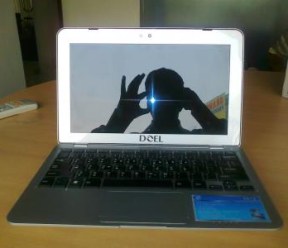Nationalized technology efforts are becoming more common as countries begin to question their reliance on foreign powers for the means to participate in modernity. China is starting to design its own processors, India is subsidizing a national tablet, and now Bangladesh (working with fewer resources, but similar intentions) has taken the wraps off a new line of ultra-cheap laptops.
The computers are branded Doel, after the country’s national bird (the magpie), and the cheapest comes to around $130, and runs Android. You scoff, but it’s a free and popular OS with plenty of room for extensibility and customization. Sure, it won’t run Crysis and the media player sucks, but it’s more than sufficient for basic computing: browsing, word processing, and document management.
They’re manufactured by contractors managed by ISS, the state-owned telecom over there. At the moment only 10% of the parts are made in Bangladesh, but ISS managing director Mohammad Ismail was confident that within six months they would be able to produce 60%. Naturally the processor and RAM and such are imported. The project was announced several months ago, but today marks the official launch of the devices.
The 10,000 Taka ($130) Model 2102 has an 800MHz VIA 8650 processor, 512MB of RAM, and a 10″ 1024×600 display. There’s no internal storage, but there’s an SD card slot. Not the hottest piece of hardware on the market, no. I would actually advise people to upgrade to the 12,000 Taka ($160) Model 0703, which brings in a better screen, Atom N456 with twice the clock speed, double the RAM, a 250GB HDD, and a better webcam. It runs a “Linux Based OS” but that can be adjusted. There are more specs and pictures at DotNews.
So basically, they’ve got their own locally-designed set of netbooks. Sure, the richest countries in the world are entering the “post-PC era,” but when generations need to be introduced to the rudiments of computing, netbooks are still a good idea. Hopefully this program gets a little traction and Bangladesh succeeds in its push for a more digital nation.
